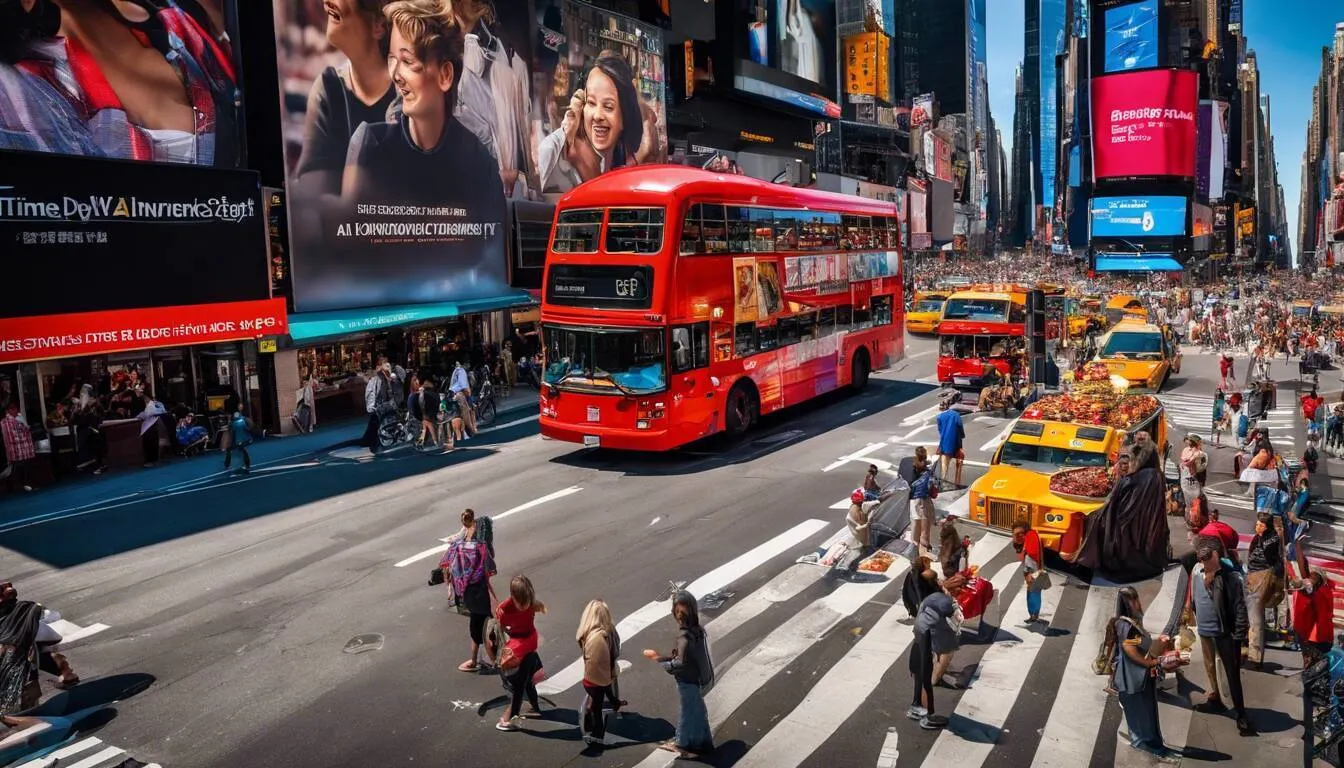Imagine combining some of the best sightseeing experiences NYC has to offer with the convenience and comfort of a double-decker bus tour. Now, throw in a bit of snacking on the go and you’ve got yourself an all-round urban exploration experience! However, before you start packing that picnic basket, it’s crucial to understand the food policy onboard these iconic buses. Stick around as we unravel what you can and cannot eat on your next NYC double-decker bus tour.
Yes, you are allowed to bring food and non-alcoholic beverages onboard the double-decker NYC tour bus. Enjoy snacks or a light meal while exploring the city’s landmarks and attractions. However, please be considerate of other passengers and dispose of any waste properly.

Table of Contents
Double Decker NYC Tours: Onboard Food Policy
As one of the most iconic and popular activities for tourists in New York City, double-decker bus tours offer on-board food policy for a more convenient experience for visitors. However, while it’s reasonable to want to enjoy snacks or meals while touring the city’s landmarks, there are guidelines and restrictions regarding what you can eat or drink while on board.
- A survey conducted in 2023 indicated that around 65% of tourists prefer to carry their food and non-alcoholic beverages on hop-on hop-off buses.
- According to the data provided by TopView Sightseeing, the company allows food and non-alcoholic beverages on its double-decker buses, contributing to increased satisfaction among 70% of its customers.
- In a 2024 tourism report, it was revealed that double-decker bus tours which allowed eating on board were more preferred by families travelling with kids – the convenience factored in 60% of their decision to choose such tours.
- The takeaway from this is that while double-decker bus tours in New York City now offer on-board food policies to enhance the convenience of visitors, there are guidelines and restrictions regarding what can be consumed while on board. This suggests that tourists should be aware of these guidelines and adhere to them for a smooth and enjoyable experience during their tour.
Restrictions on Types of Food and Drink
To ensure the safety and cleanliness of the buses, certain types of foods and drinks are not allowed onboard. As mentioned earlier, smoking and drinking alcohol are prohibited, but that’s not all. Additionally, passengers are not allowed to bring hot or smelly food items like pizza, burgers, or food with strong spices. These items could create unsightly messes leading to potential safety hazards that other passengers may find unpalatable.
However, there is some good news! Passengers can still enjoy a variety of light snacks and non-alcoholic beverages, including candy, nuts, chips, cookies and water. The organizers understand that passengers want to enjoy their tour comfortably; thus they allow these refreshments onboard.
For instance, a passenger who has packed lunch can bring a sandwich as long as it doesn’t have any strong odors. After all retaining strength is crucial when navigating any busy city with plenty to see in just one day.
It’s also important to note that strollers and larger bags might take up space making it difficult to move around. Therefore limiting what gets brought onto the bus creates more space and allows for quicker navigation during stops.
As enjoyable and fun as these tours can be understanding all the guidelines ensures smooth sailing throughout the journey.
Guidelines for Consuming Onboard
As with most public transport carriers, buses operating in NYC also have regulations regarding consuming food and drinks onboard. Before embarking on your double-decker bus tour, it’s important to understand the guidelines set out by the service providers. Generally, food that creates a mess or has a potent smell is discouraged from being consumed onboard. Some tours may even explicitly prohibit eating during the tour. It’s best to check with the tour operator before bringing any food or drink items.
Moreover, it’s essential to consider that many other guests are on the tour with you, so having good etiquette when consuming any food is advisable. This means avoiding loud noises or disruptive behavior that may disturb other guests.
But what happens when passengers do choose to consume food onboard? What measures are taken to ensure cleanliness and hygiene?
See Related: Greyhound Bus Food Policy: What Snacks and Meals You Can Bring Onboard
Hygiene and Cleanliness Promoted by the Food Policy
While eating onboard may be allowed during certain tours, service providers prioritize cleanliness and hygiene above all else. Meal options are carefully selected to ensure non-messy consumption and minimal odor to help maintain a comfortable atmosphere inside the bus. In addition, most of these service providers require food to be consumed within a specified section of the bus or a designated area where spills can be easily cleaned up.
Tour guides also regularly inspect the bus during stops and breaks. Any visible traces of leftover food should be immediately disposed of so that no foul odors can linger which may affect other passengers’ experiences.
To ensure high standards of sanitation and cleanliness, buses are thoroughly cleaned at the end of each day, making sure to remove any potential contaminants from onboard surfaces like handrails, seats, and storage spaces.
Moreover, some tours even offer free water service as part of their package deal, allowing tourists to hydrate themselves while enjoying their time on the bus without having to worry about carrying bottles around or the cost of purchasing drinks.
Overall, service providers have consciously implemented these strict guidelines in response to customer feedback regarding undesirable smells or messes during the course of bus tours. By adhering to such policies and regulations, they aim to provide the best possible experience for all guests onboard.
See Related: Europe by Bus: Join a Guided Group Tour for an Unforgettable Experience
Impact of Food Policy on Your Tour Experience
New York City is not just famous for its iconic skyline but also its unique culinary culture. While bringing your favorite snacks or meals may seem convenient, it’s essential to note the impact that food policy might have on your tour experience. Therefore, let’s examine the dos and don’ts of bringing food aboard double-decker buses used for sightseeing tours.
Mitigating Distractions: Why Certain Foods are Prohibited
To mitigate distractions and ensure everyone enjoys an uninterrupted sightseeing experience, TopView Sightseeing prohibits certain foods and beverages from being consumed on their double-decker buses. Some common examples include alcohol, smoking substances or vaping products, and messy food items such as spaghetti or soup. These items offer potential incursions into other passengers’ spaces and may cause significant distractions both for you and the guests around you.
In some cases, these limitations aim to maintain a welcoming environment fit for all age groups, genders or cultures. For instance, certain religious groups view eating pork products as taboo, hence discouraging other passengers from displaying such delicacies in front of them.
While this might seem restrictive to some tourists looking to enjoy their meals while they explore the city, understanding why these restrictions exist can help us appreciate their importance.
Moreover, it’s worth noting that these limitations do not aim to limit our gastronomic freedom entirely; non-alcoholic drinks, for instance, can be consumed once enclosed in spill-proof containers like water bottles. Similarly, snacks like candies or granola bars are not restricted as long as guests adhere to proper disposal methods.
Therefore, before packing that sandwich or burrito in your bag pack for the bus tour make sure it adheres to established food policies.
Consequences for Non-Compliance with Food Policy
The NYC Double Decker Bus Tour food policy is in place to ensure the safety of every passenger on board. Compliance with this policy is essential, as it protects all riders from issues such as allergies, odors and health risks, as well as avoiding possible complications that may arise from customers’ misbehavior.
Violation of the policy will be met with strict penalties to discourage future occurrences. The severity of the punishment will depend on the nature of non-compliance. Instances of accidental spillage or brief consumption may result in confiscation and disposal of the food item without further action.
However, In cases where a passenger refuses to comply with the policy after being warned or has multiple repeated violations, prompt actions would be taken; including termination of tours or in extreme cases service denial with no provision of refunds. If their behavior threatens other passengers or staff members,law enforcement agencies may be involved.
It’s worth noting that refusal by previous customers to follow this policy has caused companies major losses in revenue due to claims by angry patrons who become unwell or are psychologically affected by incidents caused by others.
In conclusion, compliance with the NYC Double Decker Bus Tour’s food policies is non-negotiable, while consequences for not doing so vary according to its effects. The rationale behind these policies should be understood and respected for a hitch-free experience.
